#let women be complex but especially let women of color be complex
Text
Things People Seem to Forget About Steve Rogers (aka the past is complex)
Things in the future didn't happen in a vacuum, and while Steve missed a lot of stuff while he was in the ice, he would have seen the roots of things like the Civil Rights, Women's Rights and even LGBTQ+ Rights movements in his time.
While I'm sure Steve encountered a lot of people expecting certain right-wing behaviours from him, due to his birth year and the things he missed in the ice, this doesn't mean he would act that way—even right out of the ice.
But first lets take a look at the things Steve missed and see what he did in fact know:
The atom bomb. Steve never saw the atomic fallout, but what did he see? Hydra bombs literally being flown to his home city. There is also a possibility that as a specialty team, he learned about the German Nuclear Program during the war. His unit was tied to the Strategic Science Reserve, so I wouldn't be surprised if between that, and Hydra's bomb initiatives, Steve was well aware of the potential of a bomb threat. I doubt Steve has clearance to know about the Manhattan project, and I think he would be horrified to learn about the impact of the atom bomb on Japan (especially since he essentially thwarted the same thing from happening to New York) but majorly powerful bombs would not surprise him.
• The Cold War. Steve may not have experience the Cold War, but he grew up surrounded by the outcome of the First World War after the Communist take over of Russia. The debates surrounding Communism, Socialism, and Capitalism aren't new. Steve would have grown up with them and would probably be familiar with American pro-capitalist, anti-communist rhetoric. But would he agree?
Here's some things we know about Steve: He's an artist, he grew up during the Depression which was heavily mitigated by socialist measures, he grew up poor, he grew up disabled. As an artist Steve would be well aware of the debates between the political movements, and with his background, and the success of Roosevelt's New Deal reforms, it would not surprise me if Steve leaned more towards the Socialist side of the scale.
All this to say: Steve would not be unfamiliar with the tension between Russia and the USA. Especially since even though they were allies during the war, there were already concerns that the USSR wasn't so much 'liberating' the countries they drove Germany out of, as putting them under new management.
Steve would be familiar with the tensions underlying the Cold War, and his background might lead him to have a critical view of some of the pro-Capitalist propaganda that came out during the Cold War. While I don't think Steve would approve of Russia's methods and the ultimate outcome of Communism there, I don't think he would approve of the Red Scare Witch Hunt that happened in the States either.
• Civil Rights Movement. While Steve missed the major changes that occurred during the 50s and 60s, he would not be unfamiliar with movements for equality. Steve would also not be unaware of the inequality that minorities faced in his country.
For example:
National Association for the Advancement of Colored People (NAACP) was established in 1909 and is still run today. The NAACP fought and fights against discrimination and advocates for equality.
In the 30s President Roosevelt responded to "to charges that many blacks were the "last hired and first fired," [his administration] instituted changes that enabled people of all races to obtain needed job training and employment. These programs brought public works employment opportunities to African Americans, especially in the North" (Link)
"The first precedent-setting local and state level court cases to desegregate Mexican and African American schooling were decided during [the late 1930s]" (Link)
In 1941 thousands of Black Americans threatened to march on Washington for equal employments rights which pushed Roosevelt to issue an executive order that "opened national defense jobs and other government jobs to all Americans regardless of race, creed, color or national origin." (Link)
The Double Victory or Double V Campaign during the war was an explicit campaign to win the war against fascism in Europe and the war against racism as home.
All this to say, Steve would not be unfamiliar with many of the issues tackled during the Civil Rights Movement of the 50s and 60s.
Not only that, but Steve led a multi-racial special unit during the war during a time of active army segregation. Not only does he have a Black man on his team, but also a Japanese man. This would have most definitely led to backlash from higher command as well as discrimination from other units against Jones and Morita. Steve and the entire Howling Commandos would be explicitly aware of prejudice against two of their members and likely had to fight for them many times.
• Anything space travel. It's true Steve wouldn't know anything about attempts to reach the moon. But there were still several space discoveries he could know about, especially since he and Bucky are clearly interested in scientific discoveries, considering how they went to the Stark Exbo before Bucky shipped out.
Some discoveries:
Hubble's Law: In 1929 Hubble published evidence for an ever expanding universe, and thus provided evidence of the Big Bang theory.
1930: Discovery of Pluto (makes me chuckle to think this is a relatively new discovery for Steve and he wakes up to find it is a dwarf-planet now. You think Millennials are protective of Pluto? I think Steve would be too 😆.)
1937: "the first intimation that most matter in the universe is `dark matter'"
Personally I think Steve would be absolutely amazed by the advances in space travel.
• Women's Rights. Like with Civil Rights, while Steve may have missed the large movements during the 50s and 60s, he was around for the early movements. The 60s movement is called Second Wave Feminism for a reason. This is because there was already many pushes for women equality in Steve's time.
For example:
1920: White women win the right to vote. This means Steve's mother first voted in his lifetime. I feel this alone would make Steve heavily aware of inequality faced by women. (As a side note I feel that Sarah always emphasized voting to Steve since it was such a major development in her lifetime.)
Also in the 20s the Flapper trend rose, along with hemlines. Women's skirts were shorter and they smoked and drank with men. Middle-class and working-class women also worked outside of the home. The 1920s-1930s 'modern' woman is very different from the Victorian vision of a woman in petticoats and skirts.
Early Birth Control movement: Was "initiated by a public health nurse, Margaret Sanger, just as the suffrage drive was nearing its victory. The idea of woman’s right to control her own body, and especially to control her own reproduction and sexuality, added a visionary new dimension to the ideas of women’s emancipation. This movement not only endorsed educating women about existing birth control methods. It also spread the conviction that meaningful freedom for modern women meant they must be able to decide for themselves whether they would become mothers, and when."
1936: A Supreme Court decision declassified birth control information as obscene. Legalised doctor-prescribed contraceptives.
WW2 Watershed: Women serve in the army and work factory jobs. The government establishes universal childcare while women work.
Women also wore pants and form fitting clothes to work in factories. We also see Peggy wearing pants during the last assault on Hydra. While Steve may need to get used to modern fashion, he would already be familiar with the 'morale outrage' over women's clothes in his time, and probably try to manage his surprise in private as well as possible.
• LGBTQ+ Rights. Like with the rest of the equality movements, LGBTQ+ rights movements also started before the late 1900s.
1924: "Society for Human Rights is founded by Henry Gerber in Chicago. The society is the first gay rights organization as well as the oldest documented in America." This organisation was broken up soon after founding due to arrests, but it published "the first American publication for homosexuals, Friendship and Freedom."
In the 1920s and 30s "the gay and lesbian movement started taking shape. Social analysts began rejecting prior medical definitions of "inversion" or "homosexuality" as deviant.
Communities of men and women with same-sex affiliations began to grow in urban areas. Their right to gather in public places such as bars was tenuous, and police raids and harassment were common." (Link)
WW2 Watershed: While many LGBTQ people lived in rural areas or outside 'queer neighbourhoods' the war brought people from all backgrounds together. "As with most young soldiers, many had never left their homes before, and the war provided them an opportunity to find community, camaraderie, and, in some cases, first loves. These new friendships gave gay and lesbian GIs refuge from the hostility that surrounded them and allowed for a distinct subculture to develop within the military."
They still had to hide their identities for fear of persecution and a 'blue discharge', however "Gay and lesbian veterans of World War II became some of the first to fight military discrimination and blue discharges in the years following the war."
It's unclear how much Steve would have known about the gay and lesbian rights movement. But in the comics he has a gay friend Arnie Roth, and there are many meta posts (X X X) about how Steve may have lived in a queer neighbourhood.
And, according to my history professor, gay and lesbian soldiers were often protected by their friends in the army instead of outed. This is not to downplay the discrimination and pain outed veterans faced, but there was a comaraderie and understanding that developed between soldiers that protected many gay soldiers.
• Computer and the internet. The seeds of modern computers began during World War Two. Arguably it began earlier with Ada Lovelace. While technology has changed a lot for Steve, there is a long history of it's development.
Colossus Computer: Kept secret until the 70s, it's unclear if Steve's association with the SSR, Peggy (who was a code breaker before SSR) and Howard, would have led him to know anything about the "the world's first programmable, electronic, digital computer", but we see electric screens and machines being used in Captain America: The First Avenger. So he would know something of those mechanisms.
Also the first American TV was broadcasted in the 1939 World Fair, And since Steve and Bucky are already shown going to a science fair, I believe it is reasonable for Steve to know about the concept of television, though it looks much different in modern day.
• Rise of Neo-Nazis. Steve already saw the rise of fascism in his own country before the war, so while I think he would be horrified and saddened to learn of the Neo-Nazi movement, I don't think he would be surprised.
Because:
Eugenics: A large part of the Nazi campaign, this part of the movement originated and was inspired by the United States Eugenics movement. "It is important to appreciate that within the U.S. and European scientific communities these ideas were not fringe but widely held and taught in universities."
Lobotomies and institutionalisations were part of the treatments for disabled and 'weak-minded' individuals during Steve's time. With Sarah being a nurse it is likely Steve knew of these treatments and more. And as a disabled child of immigrants, I have no doubts Steve brushed up with eugenics beliefs many times.
1939: More than 20,000 people attended a Nazi rally in Madison Square while "[a]bout 100,000 anti-Nazi protesters gathered around the arena in protest".
In the comics Steve canonically has a Jewish friend, Arnie Roth. If he wasn't part of the protests against the Nazi rally, he would have heard about it and known about the rise of antisemitic sentiment in the US before the outbreak of the war.
So Where Does That Leave Us?
Steve has a history of anti-racist behaviour. While he would still have a lot to learn from the Civil Rights Movement and no doubt has unconscious biases he grew up with, he also explicitly builds a multi-racial team that would have led to clashes with systemic racism in the army. This would have inevitably led to him and the Howling Commandos taking an anti-racist stance in protection of their members.
Would Steve say the N-word? Likely not. The N-Word already held negative connotations by the 19th and early-20th century. I doubt Jones would be willing to follow a man who would knowing use the insult. 'Coloured' or 'Negro' were seen as the more acceptable terms. So Steve may use those words at first, instead of 'Black' or 'African-American'. 'Negro' is a controversial term for some Black Americans, so this would be something for him to learn, but he would not purposely by insulting or hurtful. And I believe he would adapt as quickly as possible upon learning.
Steve saw the early steps of many social movements. Given what we know about Steve—artist, disabled, immigrant, poor, raised by a single mom, gay and Jewish friend, potentially lived around queer people, worked with Peggy and smiled when she punched a sexiest, and built a multi-racial team—Steve would not only be aware of the social movements of his time, but he would be happy to learn of the developments after he went into the ice.
While it would take some time for him to learn all the changes that happened, Steve's background would led him to be pleased with the changes in society. This is the opposite of being racist, sexist, and homophobic. Some things might take some adjusting for Steve to get used to, but he is already open-minded and has a frame of reference for many of the social changes that happened.
People sometimes bring up Steve's Catholic upbringing to argue about some beliefs he might have. But while I do think this upbringing would lead to some biases, I think Steve's life experience helped counter, or helped him unlearn some of those biases, even before he hit the ice.
Also, as an Irish-Catholic, Steve would have faced some discrimination of his own. It is most certainly not on the same level as other minorities, and things were better in the 20th century. Being very clear, any discrimination Steve faced for being Irish-Catholic would not be systemic or commonplace like racism. But adding his heritage to the rest of Steve's background helps give us a better idea of why he was already open to social movements like the Civil Rights movement before the ice. And it may have made him already more understanding of LGBTQ+ people, who he may have lived around, even if he grew up being taught certain biases.
Other Things We Forget About Steve
He is quite tech-savvy. While Steve would have a lot to learn, we know he is capable. There are a lot of jokes about his technical know-how in Avengers, but I think he's actually managing very well considering it's probably only been a few weeks or months since he came out of the ice.
Examples:
Deleted scene where we see Steve using a laptop in his apartment. He presses the spacebar to pause a video, which is a keyboard shortcut. So not only can he set up a laptop to watch a video, but he already knows key shortcuts.
Deleted scene where waitress mentions 'wireless'. Steve is confused and thinks she means radio. But I think he actually knows about wi-fi at this point, but probably had never heard it referred to as 'wireless' before. By this point he knows radio is not as common, so his real confusion is why the waitress is offering him 'free radio'. If she had said free wi-fi (the more typical phrase in my opinion) I think he would have understood.
Canon scene of Steve helping Tony fix the Helicarrier engines. This is my favourite evidence because Tony asks Steve to look at the relays and Steve makes a quip that they 'seem to run on some sort of electricity' indicating he is out of his depth. But we never see Tony tell Steve what to do. Steve figures out how to fix the relays himself. Tony is busy with the debris in the rotors and the next thing we see is Steve telling Tony the relays are all good.
Steve is much better at adapting and figuring out technology than we give him credit for. This doesn't mean he won't be anxious or uncomfortable with the sheer amount of stuff he has to learn (especially if everyone keeps making jokes about it to him). But by 2014, it's clear he's already mastered all of it, which is amazing when you think about it, because that's only two years of learning.
Steve is very book smart. In the comics Steve goes to art college, implying he finished high school. Even if he did drop out of high school to work, we know Steve is very smart.
We see him unloading a whole suitcase of books in the barracks before he got the serum.
The mental math is must take to throw the shield at the right angles for it to bounce back is insane.
Steve is also known as a master tactician. So it is clear he has the brains and smarts to run his team during the war. Not only that, but he is not just Captain in name. He actually has that rank, which means he passed the Captain's exam. I also have a feeling he would have needed to pass some kind of evaluation to get the serum in the first place.
We see in Steve's 2014 apartment that his bookshelves are full of history books. Steve is a veracious reader and spends a lot of his time catching up on what he missed. Things he didn't learn or were taught differently growing up would definitely exist, but Steve is actively working to counter that.
Steve would swear. Swearing has been a constant throughout all of history. So too, the backlash against profanity. Even if Steve grew up being told not to swear he would have heard it. And, Steve became a soldier. If he didn't swear before the war, he most definitely picked up some of it then.
I think Captain America isn't supposed to swear, and I think Steve would be aware of this perception of the symbol of him. But I think when Steve is comfortable with people, he would swear. We see in Avengers he doesn't swear, but in Avengers: Age of Ultron, he does.
We joke about Steve and the "Language" line, but I think that line has something to do with Steve's history of being perceived as a symbol and as Captain America since he said it 'just slipped out'. So, while Steve may have been encouraged not to swear growing up, and expected not to swear as Captain America, I fully believe that soldier, veteran, and Irish man Steve Rogers does swear.
Wrap up
I hope you liked this deep dive into Steve's history and character.
I think it can be easy to take the past as a lump sum and view everyone in the past through one lens. We know the past was racist, sexist, and homophobic, so we view everyone from the past that way.
And while it's true things were different back then, people were most definitely fighting for change and aware of the issues. There is also a lot of nuance to the past, and a lot that can be gleaned from what we know about Steve.
It's true that Steve would have a lot to learn when it comes to terminology and specific technology, but I believe Steve's background would prepare him for a lot of the social changes that happened after he went into the ice.
#steve rogers#meta#deep dive#long post#captain america#historically accurate#research#sources cited#early 20th century#20th century history#20th century#social movements#marvel#mcu#please don't tag the other post#no drama please#iykyk#historically accurate steve rogers
260 notes
·
View notes
Note
Zoro’s “she’s a woman” is also very funny to me, but after re-reading Skypeia I *think* I understand the vision behind it, even if the execution might’ve been clumsy.
Back in Jaya when Robin and Zoro are searching for the South Bird, there’s a brief scene where Robin criticizes Zoro for indiscriminately cutting down random critters, to which Zoro retorts that it’s the critters’ fault for getting in his way before reiterating his distrust for her. Despite this distrust, however, Zoro does seem to take Robin’s criticisms to heart as he stops uses the bladed end of his sword on critters in Jaya and mostly avoids using his swords on animals in Skypeia.
Which also creates an interesting parallel to Enel, who shares a very similar opinion to the one Zoro held in Jaya. Hell, some translations of Zoro’s response to Robin have it along the lines of “it’s their fault for challenging me” which is almost verbatim what Enel says in the arc about his “lambs.” And despite Enel insisting that he is an Equal Opportunity Vengeful God, there are scenes before the ones with Robin where Enel’s treatment of women is framed as predatory, in a way that also parallels how the Celestial Dragons are portrayed as treating women later, which also colors the way that Enel specifically attacks Robin also being predatory and motivated by misogyny. So I *think* Oda’s intent for Zoro was seeing his past attitude in Jaya reflected back at him and ultimately realizing that just because you can do something doesn’t mean that you *should* while also using the scene to comment on how god complex’s are often used as covers for bigotry.
But, even so, Zoro’s line is a clumsy summary if that’s the case. The Doylist explanation is that Oda has always struggled when it comes to threading the needle that is “how to convey female fighters are as strong and capable as the male fighters without also inadvertently endorsing real life gender-based violence” and sometimes this results in clumsy lines like Zoro’s. But my personal Watsonian head-canon is that the Plinko Horse in Zoro’s brain didn’t fire up fast enough to coherently summarize 45 chapters of character development, which results in him spitting out what sounds like a complete non-sequitur.
I respect this but my interpretation of it was Zoro does have an internalised misogyny, which is proven to us in Punk Hazard. He admits he doesn't like to nor wants to fight women to Tashigi, and Monet backs him against a wall because of it. He thinks it's dishonourable to target women as a man, and considering his dojo dad was from Wano, and he was raised with Wano ideals, AND he was raised in an all male dojo, it makes tons of sense.
I know a lot of people are confused about this because of Kuina, but his mentor said TO HIS FACE "I am a woman, you are a man. You will be stronger than me." How in the world would Zoro, at his baby age, not internalise that in some twisted way? Especially coming from the person he looked up to. It feels like it's commentary on the fact misogyny is taught, it's not just a natural born thing, and it ruins ones own perception of self and lives around them.
Zoro was quite literally raised in a male dominated space, where ONLY men were trained and told they were the strongest - it has been programmed into him. The thing is, this is written to be a NEGATIVE thing. This isn't me pointing at Zoro and calling him a piece of shit, this is me saying it's a FLAW Zoro has, and it's clearly one he must get over. The strongest swordsman in the world can literally not afford to look down on women as weaker, because I HIGHLY doubt Mihawk does that. Tashigi calls him out for it, and it's very obvious this is an internalised issue Zoro doesn't LIKE that he has.
Why in the world would Oda make Wano openly sexist towards its women, refusing to let them fight, and THEN reveal Kuina's family is quite literally FROM this country - hence WHY Kuina's dad was so insanely sexist. Of course this is going to become commentary on Zoro having to overcome taught beliefs, especially considering Zoro is one of the few Strawhats who has never actually fought a woman. Not only did he not actually touch nor fight Monet (he just scared the shit out of her), but he also took zero shots at Big Mum on the rooftop lmao. He fought her homies but not her, physically - not even once. There's clearly something going on there, and it's Zoro (and Sanji) specific, cause literally NO other male strawhat has a problem fighting women or seeing women on the battlefield (once again, apart from Sanji, and that's possibly a parallel).
I say that last part because yes Oda has sexism in his writing, but every time I hear Zoro's 'woman' line is just Oda being Oda, I want to tear my hair out. Otherwise EVERY male character would act like Zoro towards women, and they quite literally do not LMAO
I don't know why this is the hot take it seems to be, because I LOVE Zoro, but it's clear there's something going on with him in regards to internal prejudice. I think it's because, as a Sanji fan, there's an irony to saying all this lmao. But of course, I do not mean for any of this to be negative, because I am excited to see if this side of Zoro actually gets explored. Ie Zoro defeats misogyny and sexism HAHA
57 notes
·
View notes
Text
Abolition For Beginners (2023 Edition)
In honor of Tyre Nichols and all others we have lost to policing and imprisonment. In honor of Black History Month. In honor of Better Future Program's mission to educate and serve marginalized youth globally... Let's break down abolition, again. (As usual on Tumblr, tap for better quality.)
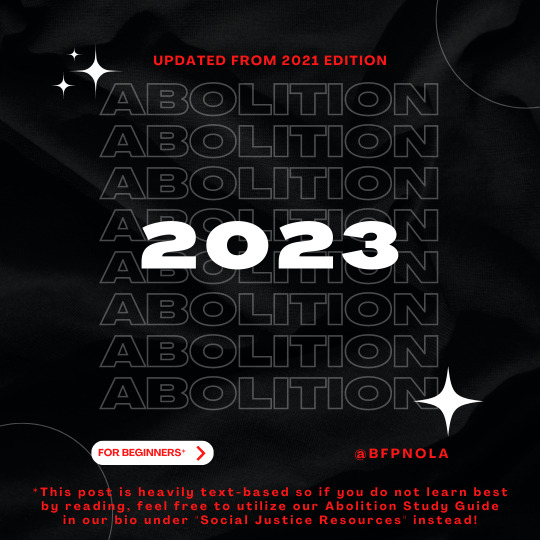
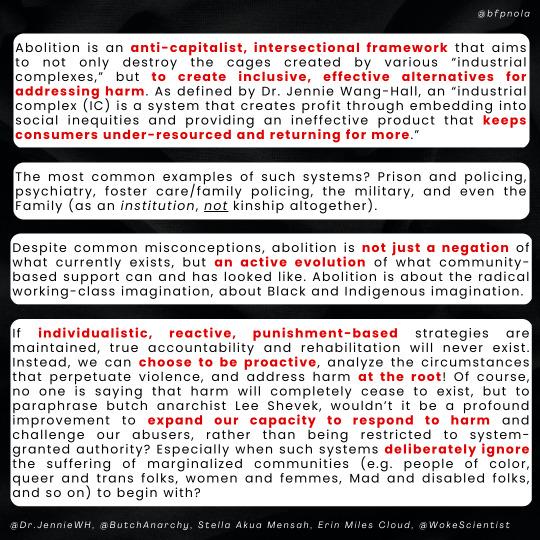

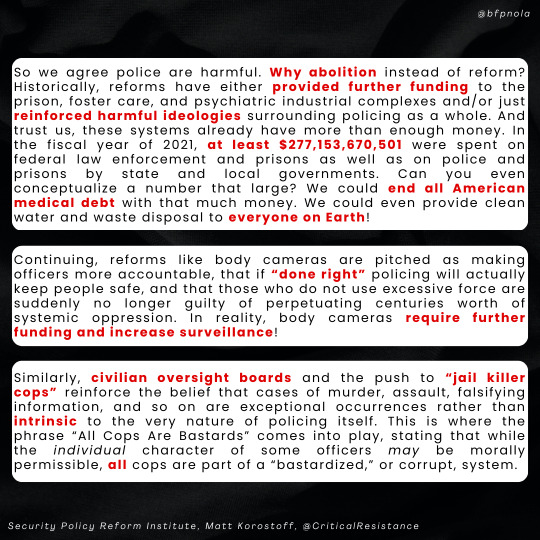
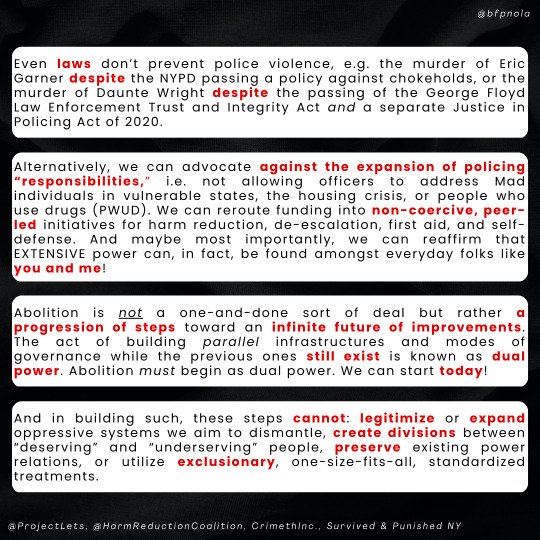
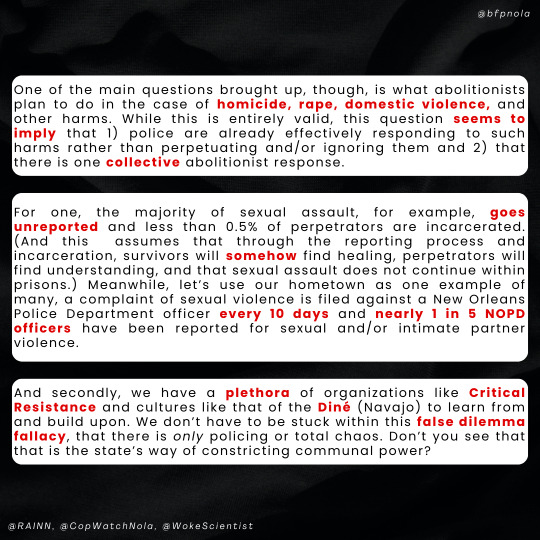

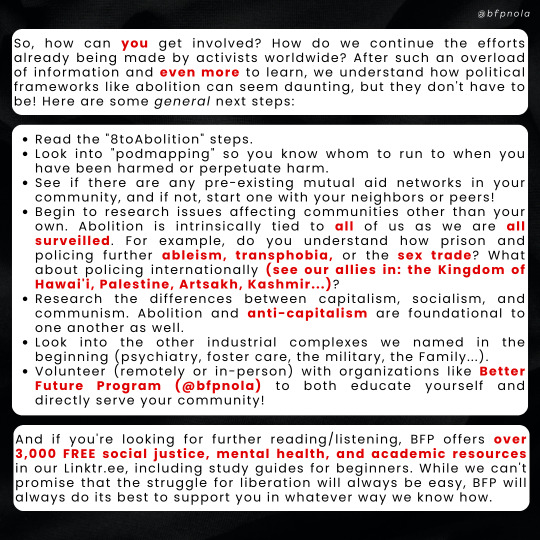
Better Future Program's Linktr.ee | Donate | Liberation Library | Open Leadership Positions | Staff Application | Discord Server
Image description below. Written by @reaux07. Proofread by the volunteers and supporters of @bfpnola.
Image Description:
[ID: All of the following slides use a wrinkled, black fabric as their background with black text (bolded red added for emphasis) on top of white boxes with rounded corners. “@bfpnola” is written in the top right corner and the sources for the slide are in the bottom left corner.
Title Slide (No. 1):
Written in red text, “UPDATED FROM 2021 EDITION.” The outlines of the word “ABOLITION” is written line by line 8 times in light grey with the year “2023” written on top in bold, white lettering. Below, written in red within a white bubble and red arrow, it reads “FOR BEGINNERS*.” Across from the bubble, “@BFPNOLA” is in red. Below, in red again, the asterisk mentioned before leads to the following note: “This post is heavily text-based so if you do not learn best by reading, feel free to utilize our Abolition Study Guide in our bio under "Social Justice Resources" instead!” Lastly, white stars and outlines of grey circles can be seen in each corner of the slide.
Slide No. 2 reads:
Abolition is an anti-capitalist, intersectional framework that aims to not only destroy the cages created by various “industrial complexes,” but to create inclusive, effective alternatives for addressing harm. As defined by Dr. Jennie Wang-Hall, an “industrial complex (IC) is a system that creates profit through embedding into social inequities and providing an ineffective product that keeps consumers under-resourced and returning for more.”
The most common examples of such systems? Prison and policing, psychiatry, foster care/family policing, the military, and even the Family (as an institution, not kinship altogether).
Despite common misconceptions, abolition is not just a negation of what currently exists, but an active evolution of what community-based support can and has looked like. Abolition is about the radical working-class imagination, about Black and Indigenous imagination.
If individualistic, reactive, punishment-based strategies are maintained, true accountability and rehabilitation will never exist. Instead, we can choose to be proactive, analyze the circumstances that perpetuate violence, and address harm at the root! Of course, no one is saying that harm will completely cease to exist, but to paraphrase butch anarchist Lee Shevek, wouldn’t it be a profound improvement to expand our capacity to respond to harm and challenge our abusers, rather than being restricted to system-granted authority? Especially when such systems deliberately ignore the suffering of marginalized communities (e.g. people of color, queer and trans folks, women and femmes, Mad and disabled folks, and so on) to begin with?
Sources: @Dr.JennieWH, @ButchAnarchy, Stella Akua Mensah, Erin Miles Cloud, @WokeScientist
Slide No. 3 reads:
Before we continue any further, let’s destroy the myth that cops actually stop violence. First off, we can’t depend on crime stats at face value because this begs the question of who exactly gets to define what counts as a “crime” and why (e.g. drug possession and sleeping in public vs. tax evasion of the wealthy and wage theft). Continuing, crime rates often only reflect violations that have actually been reported, chosen to be shown, and deemed out of line. By this logic, crime rates are simply reflections of cops’ perceptions, not of the material and emotional realities of the proletariat (i.e. the working-class).
As for perpetuating violence, “US law enforcement killed at least 1,183 people in 2022, making it the deadliest year on record for police violence.” (And those are just the deaths that were reported. In our home state of Louisiana, turns out the Jefferson Parish Sheriff’s Office, as of January 12, 2023, has been unlawfully destroying records of officer misconduct for at least 10 years.) Many (69%) of these murders were cases in which no offense was alleged, were mental health or welfare checks, or involved traffic violations and other nonviolent offenses.
This is, of course, without even touching on the involuntary servitude (i.e. enslavement) and maltreatment ongoing in American prisons. How many more deaths must occur before the general public says enough is enough? Or is this acceptable since these are working-class, disabled, Mad, non-white, queer, and trans lives being lost?
Sources: @InterruptCrim, The Guardian, Mapping Police Violence, @VeriteNewsNola
Slide No. 4 reads:
So we agree police are harmful. Why abolition instead of reform? Historically, reforms have either provided further funding to the prison, foster care, and psychiatric industrial complexes and/or just reinforced harmful ideologies surrounding policing as a whole. And trust us, these systems already have more than enough money. In the fiscal year of 2021, at least $277,153,670,501 were spent on federal law enforcement and prisons as well as on police and prisons by state and local governments. Can you even conceptualize a number that large? We could end all American medical debt with that much money. We could even provide clean water and waste disposal to everyone on Earth!
Continuing, reforms like body cameras are pitched as making officers more accountable, that if “done right” policing will actually keep people safe, and that those who do not use excessive force are suddenly no longer guilty of perpetuating centuries worth of systemic oppression. In reality, body cameras require further funding and increase surveillance!
Similarly, civilian oversight boards and the push to “jail killer cops” reinforce the belief that cases of murder, assault, falsifying information, and so on are exceptional occurrences rather than intrinsic to the very nature of policing itself. This is where the phrase “All Cops Are Bastards” comes into play, stating that while the individual character of some officers may be morally permissible, all cops are part of a “bastardized,” or corrupt, system.
Sources: Security Policy Reform Institute, Matt Korostoff, @CriticalResistance
Slide No. 5 reads:
Even laws don’t prevent police violence, e.g. the murder of Eric Garner despite the NYPD passing a policy against chokeholds, or the murder of Daunte Wright despite the passing of the George Floyd Law Enforcement Trust and Integrity Act and a separate Justice in Policing Act of 2020.
Alternatively, we can advocate against the expansion of policing “responsibilities,” i.e. not allowing officers to address Mad individuals in vulnerable states, the housing crisis, or people who use drugs (PWUD). We can reroute funding into non-coercive, peer-led initiatives for harm reduction, de-escalation, first aid, and self-defense. And maybe most importantly, we can reaffirm that EXTENSIVE power can, in fact, be found amongst everyday folks like you and me!
Abolition is not a one-and-done sort of deal but rather a progression of steps toward an infinite future of improvements. The act of building parallel infrastructures and modes of governance while the previous ones still exist is known as dual power. Abolition must begin as dual power. We can start today!
And in building such, these steps cannot: legitimize or expand oppressive systems we aim to dismantle, create divisions between “deserving” and “underserving” people, preserve existing power relations, or utilize exclusionary, one-size-fits-all, standardized treatments.
Sources: @ProjectLets, @HarmReductionCoalition, CrimethInc., Survived & Punished NY
Slide No. 6 reads:
One of the main questions brought up, though, is what abolitionists plan to do in the case of homicide, rape, domestic violence, and other harms. While this is entirely valid, this question seems to imply that 1) police are already effectively responding to such harms rather than perpetuating and/or ignoring them and 2) that there is one collective abolitionist response.
For one, the majority of sexual assault, for example, goes unreported and less than 0.5% of perpetrators are incarcerated. (And this assumes that through the reporting process and incarceration, survivors will somehow find healing, perpetrators will find understanding, and that sexual assault does not continue within prisons.) Meanwhile, let’s use our hometown as one example of many, a complaint of sexual violence is filed against a New Orleans Police Department officer every 10 days and nearly 1 in 5 NOPD officers have been reported for sexual and/or intimate partner violence.
And secondly, we have a plethora of organizations like Critical Resistance and cultures like that of the Diné (Navajo) to learn from and build upon. We don’t have to be stuck within this false dilemma fallacy, that there is only policing or total chaos. Don’t you see that that is the state’s way of constricting communal power?
Sources: @RAINN, @CopWatchNola, @WokeScientist
Slide No. 7 reads:
To expand this conversation, abolition heavily aligns with the political ideal of “anarchism.” Anarchism supports the absence of government and absolute freedom of the individual. And despite its negative connotations, anarchy also reflects an evolution of community-based care rather than just a deconstruction of what currently exists.
A simplified version of its 6 agreed-upon principles are:
Autonomy and Horizontality: define yourself on your own terms, we stand on an equal footing
Mutual Aid: bonds of solidarity form a stronger social glue than fear, support your community
Voluntary Association: associate or don't associate with whomever you wish
Direct Action: accomplish goals directly rather than depending on representatives or authorities
Revolution: overthrow those in power who enforce coercive hierarchies (ex. white supremacy)
Self-Liberation: you must be at the forefront of your own liberation, freedom must be taken
While being an abolitionist does not require alignment with anarchism, it is worth considering how the state plays such an enduring role in various social harms. Concurrently, whenever you treat other living beings with consideration and respect, come to reasonable compromise rather than coercion, and decide to share or delegate tasks, you are already living by anarchist principles.
Sources: Peter Gelderloos, David Graeber
Slide No. 8 reads:
So, how can you get involved? How do we continue the efforts already being made by activists worldwide? After such an overload of information and even more to learn, we understand how political frameworks like abolition can seem daunting, but they don't have to be! Here are some general next steps:
Read the "8toAbolition" steps.
Look into "podmapping" so you know whom to run to when you have been harmed or perpetuate harm.
See if there are any pre-existing mutual aid networks in your community, and if not, start one with your neighbors or peers!
Begin to research issues affecting communities other than your own. Abolition is intrinsically tied to all of us as we are all surveilled. For example, do you understand how prison and policing further ableism, transphobia, or the sex trade? What about policing internationally (see our allies in: the Kingdom of Hawai'i, Palestine, Artsakh, Kashmir...)?
Research the differences between capitalism, socialism, and communism. Abolition and anti-capitalism are foundational to one another as well.
Look into the other industrial complexes we named in the beginning (psychiatry, foster care, the military, the Family...).
Volunteer (remotely or in-person) with organizations like Better Future Program (@bfpnola) to both educate yourself and directly serve your community!
And if you're looking for further reading/listening, BFP offers over 3,000 FREE social justice, mental health, and academic resources in our Linktr.ee, including study guides for beginners. While we can't promise that the struggle for liberation will always be easy, BFP will always do its best to support you in whatever way we know how.
End ID.]
#reaux speaks#signal boost#tyre nichols#keenan anderson#cop city#abolition#abolish the police#defund the police#anti capitalism#intersectional feminism#palestine#black lives matter#blm#bipoc#disability justice#queer#trans#mass incarceration#study guide#mad liberation#psychiatry#family#military industrial complex#foster care#ACAB#tw rape mention#indigenous#anarchism#pinned post#BLACK HISTORY MONTH
730 notes
·
View notes
Note
Just for fun: maybe a show of how both Aemma Arryn and Alicent Hightower would affect the court fashion by being from the Vale and Reach, respectably?
Oooh that sounds fun let’s do it!!
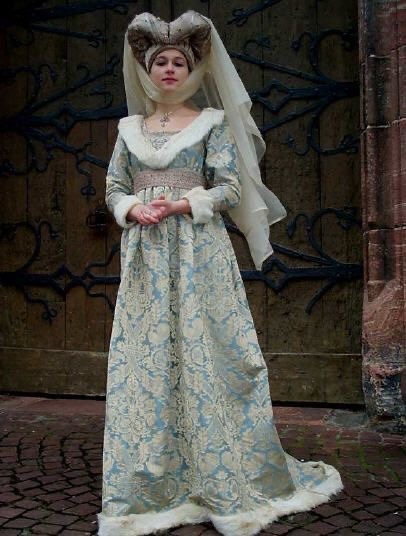

I believe in Burgundian dresses in the Vale supremacy. It just fits the vibe also fur!!! Very important no? Just overall a style that fits that elegant upper class vibe of the Eyrie before the dance, which Aemma grew up in. Big headdresses are the staple of every outfit, especially the hennin cone with a gauzy veil draped around. A very gentle, almost Virginia kind of fashion that Aemma grows up wearing and brings to Kings Landing when she becomes queen
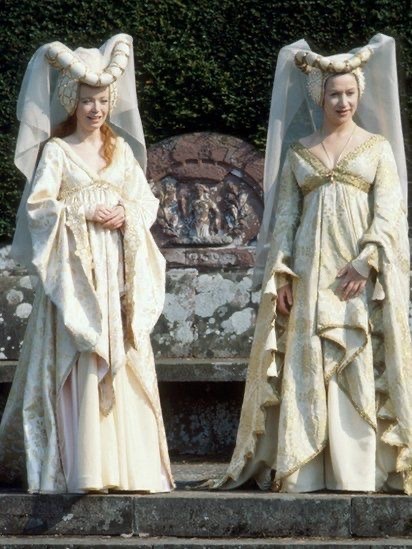
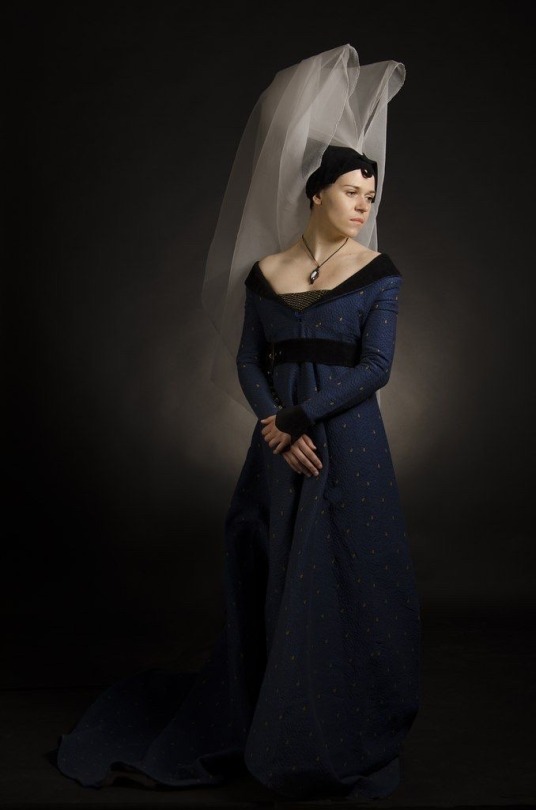
After a while in kings landing, this Eyrie fashion has adapted to the city. The basic cut of the gown is still the same, but seems to be a bit more complex and layered and sluttier. Ostentatious rich women take the idea of that elegant Eyrie fashion and just gild and glitz the shit out of it. OR a woman might downplay the gown and dress simply and just really heighten the look and size of the headdress, making it increasingly impractical (think the mid 1700s in France).
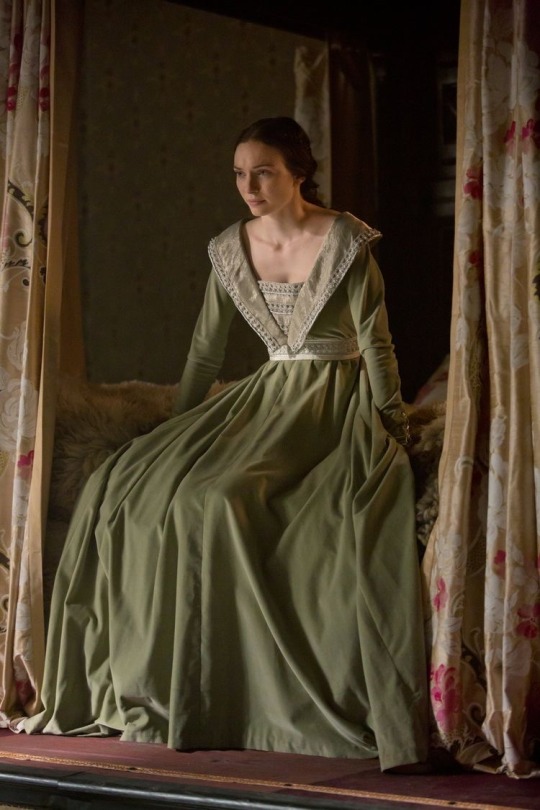

During Alicents early reign, she hasn’t garnered any influence or personal style yet and she’s still a young girl trying her best to get into the good graces of her old fart husband so she probably still resembles Aemma in her clothing. Modest and gentle without all of the grandiosity of the other women of kings landing, because of both the faith at Oldtown and her need to blend in as best she can. Eventually people start following in her footsteps, and more subdued and muted styles become popular, with a natural waist and bust coming back, as well as soft natural coloring
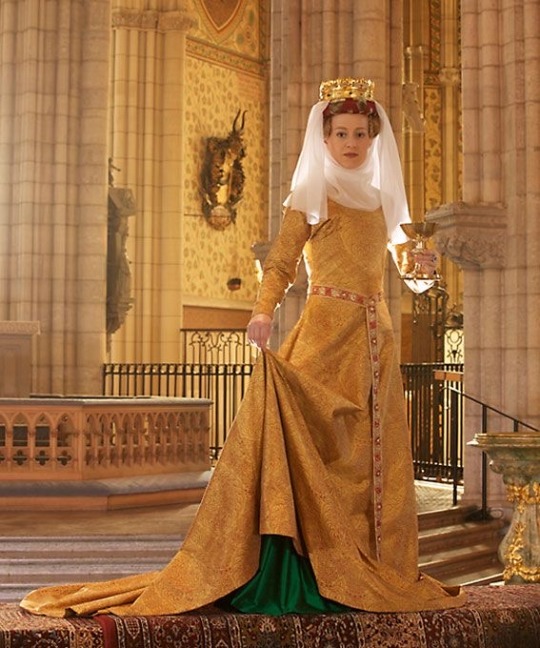

Once Alicent is firmly established, I think she starts to dress for piousness. Long sleeves that don’t billow out, skirts that cover everything and more, natural outline of the body, modest headdresses. And once the war begins this naturally starts to take hold throughout the city, as noblewomen go into mourning and also start to realize the excess they used to have cannot be afforded anymore.
#asoiaf#asoiaf hair and clothing#I know this kinda directly contradicts my fashion druring the dance ideas but#take it up with my lawyer#also yes I’m using show Alicent characterization here#you can also take that up with my lawyer
294 notes
·
View notes
Text
Women in Helluva Boss
How many times does a writer have to poorly write a female character before you have to just consider the idea the writer hates women.
Every single female to female interaction in Helluva Boss exists on a sliding scale of hostility, ramping up from Harvest Moon onward. In Harvest Moon, Millie has the most meaningful interactions for her character between her mother and Sister Sally May.
Millie and her Mother do not have a great relationship. Millie's mom is constantly scrutinizing and criticizing everything Millie does. Millie is given a blatant double standard compared to her other siblings. Anything Millie does has consequences while MtF transgender sister Sally May is spoiled by both the family and the writers.
Sally May condescends her older sister constantly. Being given a position of superiority by just her attitude while the way she is allowed to get away with the same things Millie does but can't be excused for shows a clear golden child and scapegoat child. However, none of this ever gets addressed. We are meant to believe that this is what healthy and good female to female familial relationships are supposed to look like when it hinges on unfair family dynamics.
This could have been the plot to the episode. Millie is seeking a constantly critical mother's approval while watching a younger sister get preferred treatment. It would allow a ton of character for Millie. Constant scrutiny and unequal treatment have a psychological effect on children.
Madrano insists there is a sibling rivalry between Sally May and Millie, but doesn't seem to realize where rivalries come from in family dynamics. If it was a competitive outlet like a sport, that would be one thing. However, the only comparison we see throughout the episode is that mom lets Sally May do whatever she wants while Millie is left out. That kind of sibling rivalry is not healthy on a fundamental level. Kids in healthy families get treated fairly. That means that kids should be held to the same expectations in broad strokes while making room for their individuality. Punishing one kid for doing the exact thing the other one is doing without consequence is not a loving, healthy family dynamic, and it says a lot that the criticism is leveled solely on Millie. The only cis female child.
Then there is Truth Seekers. The pilot was the only point where any suggestion of tension between Millie and Loona was expressed before the two had basically no interaction with each other in the series proper. However, it is written like we should just assume they have a not-great relationship as they make little jabs at one another. Like, there is this presumption that women just naturally don't get along that colors their entire interaction. We are supposed to get this idea that they are growing closer throughout the mission but have no foundation of where they are growing from, and every "bond" made is generously coated with backhanded compliments.
Even when being kind, the characters can't help but hiss at each other with insults towards female sensitive issues like aging. It's up there with making fun of someone's weight. It's an issue unfairly targeted towards women that is a genuine source of distress in Western society. Madrano, being a woman, especially one who has openly struggled with aesthetic concerns of her own body, finding nothing wrong with characters attacking female characters for their looks says a lot.
There are additional quips of just blatant misogyny throughout season 2. The character assassination of Stella from being a potentially abusive, cold, and selfish partner to being hyper emotional and screeching all the time with no ability to have a complex throught beyond the level of a toddler. The repeated insults of "bag of holes", "pussy face" and "tit haver" by Blitz as female side characters are boiled down to nothing but the sexual qualities which are then used to demean and belittle them.
The true zeitgeist of Madrano's attitude towards female relationships is seen best in Episode 8. The early interaction of Loona and the poodle hound is vapid, which makes the hostility feel less personal between the characters and more a continuation of this female misogyny. The reasoning for Loona to become so upset is weak throughout the episode but is simultaneously felt to be justified while being a character flaw.
The poodle shows an embarrassing picture of Loona with the same vapid reasoning as Stella: I hurt you because it's my enjoyment. Seeing how this is the second appearance of this characterization, this is where I begin to believe that Vivienne had a hard time making friends with other girls in school. Instead of any level of self-awareness towards maybe herself being an unagreeable person, she assumes this was just how women are. The way she frames Loona in a lot of these scenes feels too personal. It almost feels she assumed we all had this kind of experience growing up as young women, and that is why it never gets fleshed out more.
The scene could have been used so much better with being specifically targeted towards Loona and her character. Have the poodle say something like, "Loona? Lunatic Loona? Is that really you? We thought you, like, died or something!"
Have Loona feel awkward and out of place, unsure if it's an insult or a legitimate concern, and have her toe that line of neutrality as she tries to assess the atmosphere. It shows a desire to be accepted, a very raw inner self that is quick to be triggered, as well as her lacking in interpersonal skills. She can simply pull in with a defensive, "What's that supposed to mean?"
Then, have the poodle respond with something like, "I dunno. You got adopted one day and then totally disappeared. When they didn't return you, we all just assumed you died or some shit."
It is a cruel joke that says way more about Loona than anything we have been given. It can get a laugh as well as open the door to so much unspoken lore that fans could actively explore. It actually establishes Loona's fear of abandonment that never gets set up at all throughout the series. Even Seeing Stars doesn't establish that fear, yet still tries to act like it is present in the story.
This sort of cold disinterest in Loona better fuels the level of insecurity needed to have Loona lash out the way she does. Instead of being so thin-skinned that embarrassment alone triggers her to blow up, have it be the utter loneliness that people she knows don't care whether she is alive or dead and that she lacks fundamental worth to others.
But this isn't the only massive train wreck of escalation seen in the episode. Beelzebub is a genuinely sweet character throughout the episode who does nothing to even hint at selfishness or malice. She graciously accepts an embarrassing defeat in front of everyone while Loona can't so much as laugh at herself. Loona uses Blitz's win to then elevate herself socially in the party, not actually spending any time with her adopted father.
I am genuinely confused by people claiming that Loona was defending Blitz as Beelzebub is simply telling her that her dad is not doing well and that she should check on him. Telling someone their friend or family member is self-destructing is not something anyone needs defending from. That goes into the fanbase more than the writing however.
Back to the actual episode, the line that causes Beelzebub to snap at Loona isn't when Loona accuses her of being jealous or petty, but when Loona merely states that everyone loves Bee. For some reason, that comment is what triggers a fight. It shows a fundamental lack of understanding basic human interaction. That women are too emotional that they blow up for no reason. It almost feels more at home in a JustPearlyThings fever dream than an actual serious exploration of human emotion. Add to it the deescalation doesn't come from communication or finding common ground, but by elevating the comfort of a man.
I'm not sure how many times it needs to appear in action and be so forced to the point that it doesn't even bother to justify itself, by acting like this is just everyone's experience with women, before we can call a spade a spade.
#helluva boss#helluva boss critical#helluva boss criticism#helluva boss critique#misogeny#misogony#misoginy#misogyny#vivziepop#vivienne medrano#vivziepop critical#vivziepop criticism#vivziepop critique#these characters deserve better#this is why you need a writers room#hire writers#essay writing
196 notes
·
View notes
Text
My post about hating the Barbie movie and how it actually spat in the face of feminism and all that the franchise stands for is done and dusted, I'm afraid, but that being said there are still some points I left out of it that I would like to address, and I will do so here:
The movie portraying women as hopeless endless victims who have no hopes of succeeding or getting what they want out of life is bad enough, but there's a brief blink-and-you'll-miss it scene where Barbie is taking Gloria and Sasha back to Barbieland, and as they're on the spaceship, she says to them that women control everything and have all social and political power, which is fine...but THEN she goes "basically everything men do in your world, women do in ours" and that...that line just makes me so appalled and angry I could SPIT. Like you're really spelling out that you think women in the real world have no power or control in any aspect of society? I understand that it's supposed to be "commentary"(it's not good commentary tho) and that the real world IS a patriarchy, but we HAVE women in power in our world too! We HAVE female Supreme Court Justices! We HAVE women in high office! We HAVE female mayors and CEOs! We HAVE women in positions of power and leadership, period! And yet Barbie creates this illusion that women in our world such as Sasha and Gloria would have NO knowledge of or point of reference for women in power who do any important shit at all; it's completely fucking absurd. But then again, this movie was written and directed by a white feminist. A white feminist, who, like all white feminists, has a complete miserable victimhood/defeatist complex. So of course she projects it onto her female characters(even female characters of color, who are ofc SUPPOSED to be more sad and let-down than SHE is!), like the sad, pathetic fuck she is. And y'all wonder why I hate persecution flips so much. We need to shove that bullshit trope six feet under. If you want to tell a story about the patriarchy, then FUCK, WRITE ABOUT THE ACTUAL GODDAMN PATRIARCHY!!! Don't just do this nonsense "uwu what if men were the oppressed ones and women were the privileged--" no. Stop. Cut it the fuck out. This is getting ridiculous.
This part is probably incidental but fuck that, I'm still gonna knock it. Sasha and Gloria never actually get to experience the matriarchal utopia, and I just find that so depressing. Despite the bleak and frankly miserable lives that they lead, they never get to experience the escapist freedom of living in a society in which they are in charge, where womanhood isn't looked down upon and is in fact honored, where they have power and aren't in danger of being stalked, followed, or killed by men just for walking down the street. They leave their patriarchal world, hoping to see a world that is better, and instead enter a world that is just as bad and equally as patriarchal as the one they tried to escape from. It's truly depressing, especially for Gloria who specifically wanted to get away from her anxieties with real life and just have fun with her daughter for a bit. Instead she has to be confronted with ANOTHER patriarchy, watch the childhood doll she loved and played with have a panic attack and give up on life just like she did, and then give her infamous, cliche, and paint by numbers "being a woman is suffering" corny as hell speech. Before reinventing the matriarchy and getting her power back only by leaning in to patriarchal stereotypes about women's bodies and sexualities. And then leaving back for her regular patriarchy world without getting to experience any of it. It's almost like the movie was literally saying that women will never be able to free themselves from patriarchy and that a better world than this one does not exist. Patriarchy is insurmountable and all-prevailing, says this movie. It's truly tragic.
And honestly, with regards to that shitty ass clusterfuck of a speech, isn't it like, so totes ironic, that part of Gloria's speech is her complaining that women have to apologize for men's bad behavior...only for the "happy" ending of the movie to involve BARBIE HAVING TO APOLOGIZE FOR KEN'S BAD BEHAVIOR?!?!!??!?! Like no one fact-checked that shit and went "wait, something ain't right"? Are you fucking kidding me?!?!?!?!?! I hate that scene with every fiber of my being and realizing this makes me hate it even more now. Just, ugh.
Tldr: Fuck this movie, but then again, I've said that shit like...several times before. lol.
41 notes
·
View notes
Text
I love hazbin hotel but....nerdy prudes must did MANY things BETTER
I currently have a love-hate relationship with Hazbin Hotel, because whether I like it or not it was part of my adolescence since I saw the pilot, but I must admit that it has flaws that irritate me a lot and I know that it irritates others too:
my main problems are:
1) the humor is too immature to be a program "for adults" (there are fans who are not even older, I'm not saying that, the conventions say it💀),its the humor of a teenager that recently learned what swear words are.
They pretend this show is more complex and deep than it really is,they want us yo believe that this is how an adult show works when,NO???? THERE'S PLENTY OF ADULT SHOWS THAT WORKS WITHOUT CONSTANT SWEARING AND SEX JOKES! like My Aventures with Superman, Moral Orel, Bob's Burgers and others!
The audience of Hazbin Hotel and Helluva Boss are mostly teenagers, not even adults.
2) the villains have no depth nor are they intimidating, I'm talking especially about VALENTINO and ADAM (as much as I love Adam, I don't feel intimidated by his presence) and they don't feel like a real problem for the protagonists.
ADAM is the biggest villain of the first season but i never see him as a threat,the characters don't feel in danger,he is not a bigger evil they should care about. Adam had a lot of potential to be the big villain they tell us he is,he in fact had the potential to be the best character of the series but they just make him a douchebag just for the sake of being one,he has no motivations besides being a sadist that enjoys killing his descendants and fucking around.
VALENTINO is just a petty manchild that is intimidating in just one scene and after that there is no other moment where that threatening persona shows up again,he is not a real threat even if he is important to Angel Dust arc,they could put travis in his place and is just the same shit, nothing changes.
3) the characters have no variety, the lack of diversity and other colors that are not red is so annoying to me as a person who likes to find variety on colors and shapes, but all, i mean ALL characters have red in their clothing and it makes that they mix with the background in a way that gives me the ICK.

In the part of body shapes is the same problem, the only characters that are not skinny twinks/voluptuous chicks are antagonists or villains, they just make the fat characters annoying just to make the audience like the skinny ones more.
The women and men bodies are practically the SAME FUCKING THING:


Vivziepop only knows hourglass and twink bodies.
And as a fashion lover i must say that the lack of variety in clothes,especially for men is KILLING ME, every man in this show uses suits, shoulder pads and bowties, even if some characters looks good it make my blood BOIL no seeing other look more than this.
4) They rush the story to the point that they waste possible arcs for the characters (SIR PENTIOUS'S and ANGEL DUST path to redemption),they make the war to heaven the priority instead of the real premise of redeming sinners,they ignore it and not even make real attemps to let the audience know there is a real progress and the ways they use to "rehabilitate" are so childish that makes me cringe,if CHARLIE really wants to help them she should make REAL REHABILITATION PROGRAMS instead of kids excersises.
ANGEL DUST was a prick from day one,not only in the pilot but also in the series,he is a pos that DESERVES ALL THE BAD THINGS THAT HAPPEN TO HIM, and he was not only an addict to drugs and sex, he was a MOBSTER, HE KILLED PEOPLE FOR A LIVING AND HE SHOWED NO REMORSE, his sudden caring for the other cast feels so out of character and rushed that makes me ANGRY.
The redemption of Sir Pentious was so rushed that makes me feel NOTHING AT ALL because we dont see him get better, we dont see him chance and we dont even know how sacrificing himself redeem him, i dont know, maybe he was very selfish in life??? Its not that hard viv.
Now, what does this have to do with Nerdy Prudes Must Die? It's very simple, Nerdy Prudes Must Die takes several of Hazbin Hotel's flaws and makes it BETTER.
1) the humor is universally funny, it is not sold as something for adults because it has swear words or sexual jokes, it is not shown as something more mature or profound than it is, they know that it is not the eighth wonder of the world and they make the most of it doing comedy, improvisation and very funny situations.
Their songs, for example, are very fun and bring weight to the plot. Each song shows a perspective and the thoughts of the characters that cannot be expressed in words. Each musical number enters the minds of the protagonists, from the beginning to the end.
2)MAX, the villain of the story, is the nightmare of every teenager who has gone to high school, a bully who gets his way and makes everyone's lives impossible, and that makes him SCARY AS HELL.
When MAX enters the scene you can see the fear that everyone has of him, he feels intimidating and inspires fear and respect among others, everyone knows that if he is around there are SERIOUS problems and he acts like a true threat.
and MAX is deeper than he seems, unlike ADAM or VALENTINO you can notice that he has certain qualities that make him charismatic such as being naturally funny, appreciating when people do good things for him, having a genuine interest in GRACE CHASTITY and that his family life not being the best means that you can have even some affection for the character without leaving aside his actions against others.
All the characters represent the average 17 year old teenager and that makes them friendly, they show the reality that adolescence regardless of who you are has its problems especially in an environment like high school.
The protagonists are sympathetic, it's easy to get attached to them, I still haven't get over RICHIE'S death and his "im not a loser" because we saw that in fact he wasn't just a loser, he was a someone who, although he had his problems, was a good boy and he didn't deserve the ending he had(and his dead showed how sadistic Max could be).
Unlike Sir Pentious and Angel Dust we were able to see more of Richie, we were able to see that he was the one who felt the worst about what they did to Max, while the others are worried about going to prison he talks about how he feels about it (" i think im gonna throw up"/"oh my ashtma is back"), we can see that he wanted to be accepted as someone important on the team and when he finally feels valued Max kills him when he feels his kingdom crumble, in my opinion his "im not "a loser" is a way of giving himself confidence or courage to confront his bully from years ago but obviously it didn't work and he ended up dying in a horrible way, what makes it sadder is that he probably tried to run away from max and ended up in the bathroom because every victim of bullying knows that it can be a safe place (locking yourself in a cubicle until the bully leaves) but Max being a ghost didn't work:(
the characters are empathetic almost without wanting to, even MAX can be empathetic if you analyze enough.
3)there are more diversity here than any other series of vivziepop, i know is different because is a live musical with real people but they make sure that EVERY CHARACTER IS MEMORABLE, every character has his own quirks and clothing that makes them stand out.
We see variety of colors, races, faces and more! They make them iconic and easy to remember in all scenes, no character is left behind and they all are unique in clothes, personality and depth.


4)The story doesn't feel rushed, they take enough time to tell the story without making it too long or shortening it either, each arc is resolved in a way that goes well with the plot and doesn't feel forced.
My god, STEPH AND PETER have more chemistry than CHARLIE AND VAGGIE and they achieved it almost effortlessly. Their arc is not the best in the world, but I love their dynamics and chemistry more than CHARLIE and VAGGIE (and I like Chaggie in concept) and the story advances without the need to focus only on one character, everyone has their moment to shine and that fascinates me about this musical, each one is in the spotlight at the right and necessary moment.
In conclusion: Vivienne should learn from starkid, who were able to make a story that, although it begins superficially with a teenage drama, over time becomes deeper and talks about hard topics such as bullying, murder, death and the occult. way that we can feel connected with the characters and with the story in general, they give us a story with soul, something that unfortunately makes the hotel fail completely, it also helps me accept that I can like a series and still recognize its mistakes and see That others can get it right where Hazbin Hotel went wrong.
#hazbin hotel critical#nerdy prudes must die#nerdy prudes must die analysis#analysis#comparation#starkid npmd#starkid#npmd#npmd max#You must be a SHITTY writer for a teenager with a god complex to be a better villain than a THOUSAND YEAR OLD MAN
45 notes
·
View notes
Note
okay jess. i made the underwear post. what about the lingerie.
OKAY SO. there are a few things at play here so im just gonna go through them one by one
for jace:
jace's love of fine things. this is practically canon to me. he loves his expensive green velvet couch, his cashmere maroon sweater, his veuve clicquot brut yellow label champagne, etc etc he is soooo into the finer things in life. hence, lingerie. lots of lace and silk and ribbons. LOVES the texture and the way they feel against his skin.
jace's desire to be desired. have you seen that quote from robber bride by margaret atwood? jace read that and said "but that's good actually??" he likes knowing other people, ESPECIALLY porter, find him attractive, that they Want him, that they're watching him put on the show of a lifetime. and lingerie is a way to make himself more enticing to watch
jace genderfuckery hours. i think @zukkacore did something to my brain with dyke jace and now its all i can think about. what IF he got to dress up a little bit.
my theory of jace's sexuality includes him using sex as a tool to get what he wants and well. playing into porter's whole masculinity neuroses where he's this Big Strong Man who is Conquering and Ravishing the Weak Pretty Sex Object is a great way to manipulate him into things. the amount of presents he's wrung out of porter by asking for them in a post-coital afterglow is insane.
his favorite kind of lingerie is, imo, lacy two-piece sets, but he ALSO loves the ones with garters and stockings. please picture starbreaker wedding night roleplay where porter rips off jace's garter with his teeth. thank you. as for colors... i mean you know i'm sticking with jewel tones UNLESS it's the aforementioned wedding night roleplay because then jace is in white and pale blue or pink.
for porter:
i have been BARELY restraining myself from making posts about transfem porter for weeks now. the amount of times ive almost posted "corollary podcast to complicated women called could transition have saved her and the first episode is about porter cliffbreaker" today alone. so. yknow. lingerie as a method of gender exploration. in an alternate universe where she's not confined by the Evil Plan.
for something more canon-adjacent, i could see porter being a silk robe guy. again he's not on jace's level but it IS something delicate and soft and non-utilitarian that he lets himself have.
keeping with canon-adjacency, and this is gonna sound sad, i honestly don't think porter even tells jace about this part of him because he can't handle being seen as Weak due to [handwaves at his nightmare-inducing complexes about his masculinity]. he truly believes that if ANYONE found out something catastrophic would happen.
however porter loooooves lingerie on jace. he has opinions on what jace wears, likes having that level of control over him and how much jace wants to please him. obviously he loves to rip jace's pretty underwear apart and leave him looking absolutely ruined whenever they fuck.
okay finally these are all the thoughts i have on them WOW this got long sorry about that. but it really truly is a topic that needs exploration i think!!
22 notes
·
View notes
Note
My apologies if you have answered this before but I was wondering what are your thoughts on the portrayal of Jo in Little Women (2019)? I like Saoirse Ronan as an actress and I think she did wonderful in the movie but the role she was playing didn’t feel like Jo March at all. It feels like a completely different person with the same name. Does that make sense? Like Jo in the 2019 version is a different person than the Jo in the books. And honestly I was kinda disappointed because the aesthetic and scenery are lovely but the writing was not little women at all.
No worries, I don't know if I've ever done a full detailed explanation of my feelings on Jo's character in the 2019 specifically, so this is a good excuse to talk about it. I completely understand what you mean, her portrayal did not feel in anyway the Jo March I came to know and love after all the years. Let's explore Jo's character assassination.
When I first heard of the project, I was so excited because for a long while Saoirse Ronan was my first choice to play Jo. I have seen her in many movies from "Atonement", "The Lovely Bones", "Brooklyn", and I agree, I believe she is an amazing actress, and I was excited to see what she would do for Jo. On a technical standpoint, she did act very well in the film, but whether or not I felt she deserved an Oscar nom for the part is something different. I personally think she didn't deserve it, not because she's a bad actor, but I don't think what she gave for the character felt worthy of it, you know what I mean? If anything, I think Lupita Nyong'o deserved it much more for her parts in "Us" than Saoirse did for this film.
So where does the problem lie? The writing. I would like to have it on record, I am not one of those people that say that every book adaption must be 100% exact from page to screen, I am open for leeway, creative choices, and cuts, but what I felt was done wrong here was simplifying and changing characters to the point they felt like hollow versions of their flawed but beautiful book counterparts.
Jo is one of the most complex characters in the novel, as her arch starts as a 15 year old girl who is all tomboy and rebel to an independent but loving woman she becomes. We see her reject ideas of marriage because of the social pressures she feels to marry well and how marriage at the time was a loss of freedom for women, to understanding that being a woman isn't contained to one specific box, that she is able to be independent while also having a husband who supports her dreams. She has a temper, it isn't something she gets over as quickly as she has a moment of crisis, she learns how to handle it, like Marmee did. She has internal misogyny that colors her viewpoint of the world, especially women, to understanding that women are as different as each March sister is, and that doesn't lessen their worth as women. Are these lessons we find in the 2019 film? No, it isn't.
Gerwig wrote Jo as if she was trying to appeal to the masses, giving her contradictions that go against her growth and character. Seeing her yell at Friedrich, throwing a tantrum worthy of a kindergartner, and acting selfish throughout her adulthood when it's the time she is the lest selfish is so wrong for her. Jo as a child was not kind, I think we as a society need to stop demonizing a 12 year old Amy for getting fed up when her 15 year old sister continually picked on her for so long that she snapped and did something she came to regret. These are kids, they are meant to be flawed, even annoying, and yet, so many people try to raise child Jo up as if she is the symbol of feminism when she was anything but. And Gerwig followed suit.
Throughout the movie, Jo acted so childish and it was portrayed as liberating, that her maturing means a sacrifice of her true self, that it leaves her sad and alone, and I feel like this is the opposite of real life. I am about to be 30 in a week, and as I have reflected in my life, I have never felt more like my true self in my whole life. It's because I had trials and tribulations to challenge me, question how I see the world, what do I want, where do I wish to go? These are questions we all go through as we get older, and it doesn't mean that we grow older and sadder, it means we change and become more self aware, closer to who we may truly be than anything else. And never forget, there is still so much life ahead, we have so much to learn, plenty of time to become who we ought to be. As David Bowie said "Aging is an extraordinary process whereby you become the person you always should have been."
Jo by the end of the film gains no character arch, she remains practically the same, having issues with change, relying on the familiar rather than ready to explore the unknown, going back on her feelings on Laurie to the point of writing a letter to accept him, which NEVER happened in the book, as she stayed firm on her resolve that she didn't love him romantically. The lack of an arch for Jo means we don't see her grow up, she stays this perpetual 15 year old girl who is selfish, can't take criticism (which book Jo gladly did as an adult), is pressured by her sisters to chase after a man she didn't even seem that interested in (if you go with the one ending), or ends up sad and alone with her book which is what she didn't want to do as she proclaimed she was lonely (if you follow the other ending). Her story is unsatisfying, as it paints her this tragic figure that never got what she wanted in life, despite that not being the case.
She gets to open a school that helps underprivileged kids to get an education, she gets to become an author in the following books, marries a man who loves her not only as a wife but as an equal, has children she loves dearly, and by the end feels she has had a fulfilled life that she wouldn't have traded for anything in the world. Gerwig didn't seem to understand that Jo could be all these things and decided to stick with what she wanted the character to be, but knew she had to satisfy the divided fanbase, hence the confusing ending and character that is Jo March.
Gerwig tried to add in elements of the real life Alcott, thinking that the idealized version of Jo and she were exactly one in the same, but it's not true, as Alcott did long to have a family of her own, had been in love with Henry David Thoreau, and wrote the character of Friedrich Bhaer as the expy of him to be with the expy of her. If Gerwig truly wanted to respect the wishes and vision of Alcott, she didn't need to look further than the wonderful novel she wrote over one hundred years ago.
In the end, the Jo we see in the 2019 film is nothing more than a hollow shadow of a great literary character that was destroyed by someone who, like the people she pandered to, never quite understood Jo in the first place, and therefore didn't deserve her.
25 notes
·
View notes
Note
enobaria or foxface for the ask game!
send me a character and i'll tell you:
ENOBARIA ♡
My first impression: unlike with clove i was intrigued by eno from the start especially when katniss straight up said she ripped out someone's throat and i immediately began rooting for her
My impression now: i adored meta golding playing her, she's one of my favorite district 2 girls ever and i love the balance between her being deadly and vicious and loyal because thats what her culture taught her while at the same time wanting revenge for her mistreatment by the capitol
Favorite thing about that character: her teeth and what she did, but it doesn't define her, it emphasizes how ruthless and strong she is which is why i like it
Least favorite thing: there is nothing wrong with her, especially because honestly she presented herself as a lot more civilized and mature than cato and clove did - which makes sense since they were teenagers taught to enjoy brutality and we all know how teens act, but eno just didnt have the same problem of arrogance and could be cutthroat without accidentally coming off as an unempathetic cold hearted jerk
Favorite line/scene: let them have a taste of their own medicine - what i adore about suzanne collins is that with even one powerful line she can completely change how a character is perceived, and thats so clearly true in the case of the district 2 characters who seem to be one thing but then end up having a secreg deeper complexity that katniss didnt notice
Favorite interaction that character has with another: baring her teeth at katniss as an intimidation tactic will never not be funny
A character that I wish that character would interact with more: i would have given an arm to actually see her mentor clove
Another character from another fandom that reminds me of that character: mazikeen smith from lucifer - both badass women of color that hurt people but also deep down have some kind of emotional struggle
A headcanon about that character: i might be a basic bitch in that i think for the most part the teeth thing was done without her consent while she was sleeping/in surgery after her Games, but its also plausible she did it on purpose - not to scare off sex traffickers but as some kind of weird guilt response?
A song that reminds me of that character: Teeth by 5 Seconds of Summer and/or Carry On by The Score (i think that this song relates to all d2 tributes in general)
An unpopular opinion about that character: idk that I really have one sorry shes not particularly controversial as far as fandom goes and everyone's takes on her are for the most part usually pretty solid/defensible
Favorite picture:

the gorgeous waves of hair and the crazy look in her eyes and the teeth!!
FOXFACE ♡
My first impression: i don't remember because it was a long time ago but i don't think i had any significant thoughts about her other than whatever katniss said which was basically okay she's a sly redhead with a thing for botany
My impression now: i don't spend a lot of time thinking about her but i think she could be a potentially interesting character to examine especially how she thinks since katniss praises her intelligence
Favorite thing about that character: she's really smart and nimble which is cool
Least favorite thing: i don't have one she is extremely not at all controversial
Favorite line/scene: in the movies i liked her at the plant stations, in the books it was the thing with like the career pack's cornucopia mines and how she managed to outsmart whatever the d3 kid did to it
Favorite interaction that character has with another: she has not talked or allied with anyone ever as far as we know. her bumping into katniss in the movie was pretty funny - although i can't remember if that was a blooper/deleted scene or not.
A character that I wish that character would interact with more: ......... yeah can you tell i never think about her, but oddly enough my weird pairing is glimmer/foxface
Another character from another fandom that reminds me of that character: I'm at a loss for how to answer this so ignore
A headcanon about that character: she must be really into solving puzzles as a hobby
A song that reminds of that character: the brain is not braining for this one i haven't thought about foxface in years
An unpopular opinion about that character: the berries thing probably wasn't suicide, i get the logic of where that comes from but me personally if i was close to ending the games a winner i would just wait all of it out. maybe she didn't recognize nightlock because it just didn't appear at the plant station? anyways the point was that katniss overestimated her.
Favorite picture:

the pfp of @foxx-face-blog
#anna answers#thg#the hunger games#enobaria#foxface#thg enobaria#enobaria thg#foxface thg#thg foxface#district 2#district 5#persephoneprice#ask games
10 notes
·
View notes
Text
Criminal Case’s Subversive Portrayal of Cheerleaders Part 1/3: Introduction + Madison Springer, Part 1
A/N: This was written a bit later than expected, but life got in the way. Either way, enjoy! And thank you to everyone who voted in my poll!
Cheerleaders do not always have the most positive representation in media.
I feel like that’s hardly a controversial statement. Books, movies, shows, games, etc., especially those in the 2000s and 2010s, often portrayed cheerleaders in a very stereotypical, unflattering light. Cheerleaders are the mean, popular girls. They’re not very smart. They’re very clique-y. They’re bullies, and cheerleading is definitely not considered a sport. Portrayals of cheerleaders like this often cross over and are related to how femininity/girls interested in stereotypically feminine things like clothes, makeup, male attention, the color pink, etc., are often demonized, too, portrayed as mean, vapid, and shallow. (That’s a topic for a whole different analysis.) But my point being, if a female character is a cheerleader, even in media from the 2020s, chances are fairly high that this character is going to be mean, stupid, vapid, or a combination of all three.
I used to be a cheerleader in junior high and my first year of high school, and this always frustrated me. I was an avid reader of YA novels in junior high/high school, and it always frustrated me when the cheerleader characters were always written the same. I still pick up the occasional YA novel, and portrayals of cheerleaders continue to annoy me. (I recently read a novella published in late 2019 that fell into the trap). I may no longer be a cheerleader, but I will continue to defend cheerleaders with my life, take issue with how they’re portrayed in fiction, literally make OCs who are cheerleaders (one of my OCs is literally a college cheerleader majoring in Information Systems who works in IT), and insist that cheer is a sport (if anyone disagrees with this, I dare you to look up cheer routines on YouTube and say that what those people do isn’t a testament to incredible athletic skills). Point being, by the time I really got into Criminal Case near the end of my high school career, I was very tired of unflattering cheerleading representation.
Then a miracle happened. While playing University in Grimsborough (I played these games out of order), I met a character who defied multiple stereotypes associated with cheerleaders and made me fall in love with her: Madison Springer. And upon returning to Grimsborough in The Conspiracy (which I started only sometime earlier this year and which, along with Save the World, are the final two games I haven’t played; like I said, I played these games out of order), I met two more characters who defied stereotypes associated with cheerleaders: Vicky Lopez and Chelsea Bloom. And even in her own weird way, Polly O’Brien also defies some stereotypes associated with cheerleaders.
SPOILERS FOR GRIMSBOROUGH AND THE CONSPIRACY BEYOND THIS POINT.
Something common amongst all four young women, including Madison, is that all four characters start out seeming to conform to stereotypes, before being revealed as far more complex and much kinder than initially let on, in Madison, Vicky, and Chelsea’s case, or crueler, in Polly’s case. Both Grimsborough and The Conspiracy subvert expectations and stereotypes that their cheerleader characters appear to fall into. Madison is initially introduced as a sorority president before it’s revealed she’s a cheerleader in Murder on Campus, where a freshman who had just been invited into Madison’s sorority, Rani, is murdered. The first impression Madison gives off is not terribly flattering. There is a “massive portrait of her in the sorority common room,” as Jones says, and she makes some unfortunately racially/culturally insensitive comments about Rani and Misha Goshwalla that there’s no defending. She also slut-shames girls of other “skanky sororities.” Jones hardly likes her upon this first introduction, saying that “she’s lying through her teeth” and saying “I’m convinced there’s evil lurking behind those big puppy eyes.” And Madison conducts some sort of hazing on the sorority rushees (although this isn’t what killed Rani), and lies when she insists no one under 21 drank champagne. Additionally, when Rani passed the hazing “with flying colors,” as her sister Misha says Madison said, Madison called up Misha and said that Rani was much cooler than Misha, all of which added/contributed to Misha’s long-standing envy of her sister, which made her susceptible to Tess’ hypnotism, and led to her killing Rani, upon Tess’ prompting that “it was the right thing to do.” After Misha is arrested, Madison surprisingly nicely (probably trying to use emotional manipulation) asks the player and Nathan to help her find her missing sorority president pin, and makes it clear that she is not happy with her sorority sister who presumably stole her pin, and despite Nathan’s prompting not to do so, plans on punishing said “traitorous” sister.
Whew.
Bit of a yikes. When I was rereading the transcript for Murder on Campus while writing this, it really brought back how unlikable Madison was in her first appearance. Jones doesn't like her, and I doubt people playing the game are supposed to, either.
However, technically it’s not mentioned that Madison is a cheerleader in this case, just a sorority president, so technically, there’s no cheerleader bashing going on. And the next time she’s a suspect in a murder, in Dead Man Running, where it is revealed she’s a cheerleader, she gets more nuance and sympathy--although it doesn’t start out this way.
During that case, it’s revealed Madison was dating the victim, quarterback Troy Takiguchi, which Jones correctly declares as cliche. When Jones and Player talk to Madison, she says she’s more concerned with being dateless to the upcoming prom ball, once again showing her as rather shallow, not seeming to care for very valid/sympathetic reasons that her boyfriend of six months is dead, still more concerned about herself. Still not a very flattering portrayal of a cheerleader--but we’re about to make progress.
Because, later, Jones and Player discover Madison’s beaten-up phone in Troy’s room, and with Alex’s help, find out that Madison knows, thanks to her friends telling her, that Troy was cheating on her, which leads to this exchange:
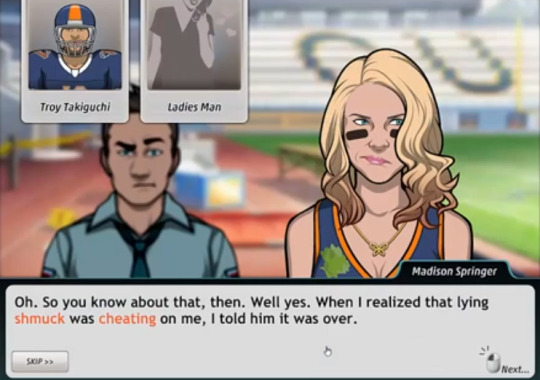
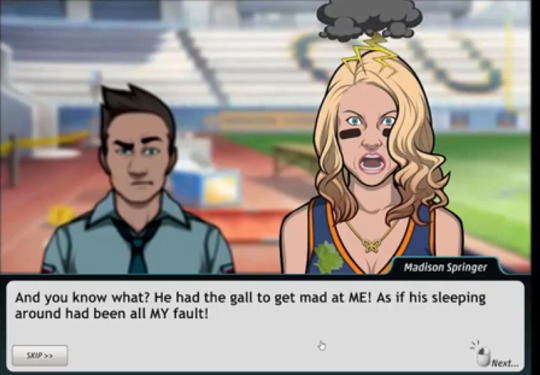
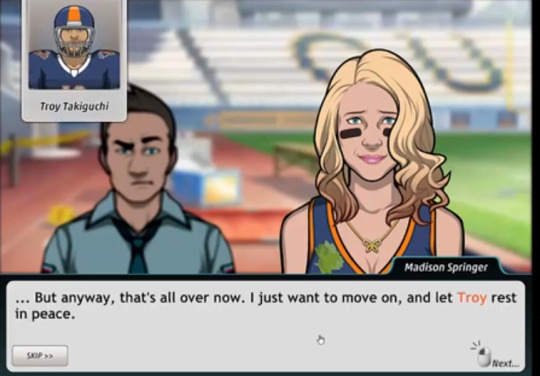
I honestly really like this, and is perhaps the first example in the game of Madison being likable, because this is a very positive example of her showing that she knows her worth. She’s rightfully angry, and allows herself to be, without being condemned by Jones/the narrative or accused of murder. When her cheating boyfriend tried to blame her for his infidelity, she snaps back that it was not her fault, and breaks up with him, not giving him another chance. An example of toxic masculinity/patriarchy is when men blame their partners for said men’s infidelity, and Madison is having none of that. In reality, compared to what she said in her first interrogation, she would rather preserve her dignity and self-worth rather than attend the university dance with her unfaithful boyfriend. She cares about her reputation, yes, but she also cares about her self-worth and knows she deserves better. And this is the fork in the road and the turn for the better in terms of how Madison and cheerleaders are portrayed.
Madison still keeps some of her rude personality, though. In the additional investigation of that same case when Jones and Player go to check up on Madison before the Quails’ football team plays, and see her saying:
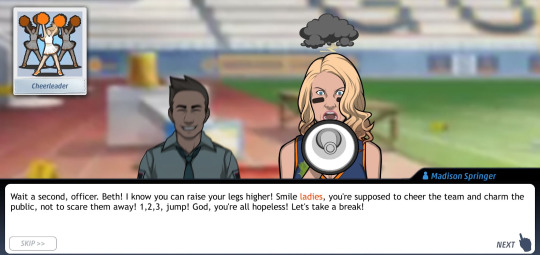
Honestly, I’m not sure why, but this line made me smile--and the rest of the interactions Player and Jones have with her come off as less of her being nasty and more as rude, but…good natured in a way? More light-hearted? Less serious than a sorority girl hazing new recruits. Just a cheer captain being impatient with her team, still not incredibly flattering, and she obviously isn’t kind, but better. And then she then says, “I know it’s a bit impolite to ask you, but I really need your help. As I said, I lost my new cheerleader's pom-poms, the blue and gold pair I'm supposed to use during the match!...Please, can you look for them while I try to create something at least resembling a cheerleader's performance with my team?” Still a bit rude, perhaps manipulating Jones and Player, but much more light-hearted than the last time she asked you to find something of hers that was lost. And when you find her pom-poms, Jones says the following:

The last line is said with a smile on his face. I do think there is maybe a touch of sarcasm with the “charming girl” part, even if she is more likable in this case, but either way, I find the message on her pom-poms rather amusing (I wonder who this eponymous Beth is), and I like how Madison being like a drill sergeant, as Jones puts it, isn’t used to insult her or call her out for being bossy and loud. She’s being stern as she’s yelling at her team, but it’s not really portrayed as her being mean or nasty. And when you return her pom-poms she’s complimenting her team and allowing them a break. And with one last little dig at Jones’ lack of popularity during his schooling days, she tells Jones and Player to go get a hamburger/hot dog at the vendor stands, saying they’ll get the food for free if they say Madison sent her--and that wraps up the interaction you have with her in that case, and interactions with her end on a much more positive note here in comparison to Murder on Campus. She’s cast in a bit more likable light in the case she’s introduced as a cheerleader.
…And that actually wraps up part one of this analysis, because this is getting a bit long.
But stay tuned for the next part, where I talk about how Madison is written in The Devil’s Playground, Spring Break Massacre, and The Rorschach Reaper, where things get even more interesting.
#criminal case#criminal case game#criminal case facebook#criminal case grimsborough#madison springer#criminal case analysis
32 notes
·
View notes
Note
Honestly these anons seem like chronically online Gen Z queer people to me. I say this as a Gen Z queer person who is ALSO very online, just THAT online. Bigotry, biphobia, etc. obviously exist, but when their core argument is essentially that a tumblr blogger saying a character is gay = biphobia, and not only that, but is somehow "one of the most wildly bigoted things" they've ever heard, that's... wow.
Tell me your entire sense of identity is shaped by TikTok discourse, Twitter battles, and fictional ships without telling me. Tell me you don't experience rl bigotry without telling me. I'm GLAD this is the post HS-world and things are better for lots of LGBTQ+ teens, but it also often just creates whatever... this is. It reminds me of this:
https://www.reddit.com/r/facepalm/comments/15nabrt/how_do_you_add_this_clouds_background/
It also seems like they expect ST to follow modern 2024 zoomer ideals instead of being a show set in an 80s context with specific narrative intentions. They wanna make the show into their own image instead of actually looking at the show and accepting what it says.
How are they not exhausted? Also, why do they care if you believe Henry is gay? No one's stopping them from believing otherwise.
Ate and left no crumbs.
Also, why do they care if you believe Henry is gay? No one's stopping them from believing otherwise.
Half of them seem to think that me saying Henry is gay takes away from Patty and her narrative importance, and that I'm doing so because I'm racist and misogynistic/I hate black women/etc.
What they don't seem to realize is that my actual point is: Patty is so much more than her relationship to Henry, and that her relationship to him is far more complex than "boy loves girl", just like Henry's relationship to Patty is more complex than "boy loves girl".
It's a whole thing that like...I don't think they understand that in their arguments against Henry as a gay man, they're tokenizing Patty as a black woman and she's the token "interracial rep" to them, just like Henry would be the token "bi rep" to them. Or if they do understand all that, they're being intentionally obtuse about it.
By using her relationship with Henry as a talking point they're reducing her down to her relationship with the white boy. In doing that, they argue in favor of Patty being nothing more than Henry's girlfriend/"I can fix him" therapist-y role. I'm not sure they realize exactly how destructive a narrative like that is, especially for a woman of color in relation to a white man.
In reducing Patty to Henry's girlfriend, they're also erasing Patty's own queer coding, specifically her lesbian coding, as well as her struggle to use her "normal" relationship with Henry to find a place where she fits in/is accepted and where she can also gain autonomy from her controlling white father in a racist, heteronormative, patriarchal society that wants her to be as white-assimilated, "normal", and wife-ly as possible. She's seeking safety, rebellion, and emotional connection in a boy who "matches her freak", so to speak.
Henry, as a sweet, lonely, nerdy, gay white boy, is a golden goose. Patty, as a pretty, nerdy, ostracized weirdogirl, is Henry's golden goose. Supernatural aspects aside, they're each other's life rafts in a society that would condemn the "real" them.
But sure! Let's ignore all that for "he was a boy, she was a girl...Can I make it any more obvious?"
On top of that: I would still feel the same way about hentty and gay Henry if Patty was a white girl, which is evident in my feelings on Mike, El, and miIeven.
The other half re: bisexuality...well. We've been over that.
9 notes
·
View notes
Text
Feelings about Bringing Back Moffat For RTD2 + Other Writers I Think Should Get the Chance
Whelp, just found out that Steven Moffat is going to be writing an episode of Fifteen and I'm just like...eh? about the whole prospect. Like, not as terrified as I once might have been but like...hoping he grew as a writer. Because even though I vastly prefer his one-offs to his overarching season ideas...let's not pretend that you couldn't see the warning signs looking back. The focus on either women as mothers (Doctor Dances) women companions as operating in service/deference to the Doctor (Empty Child/Blink) or women as the Time Traveller's Wife (Girl in the Fireplace, Silence in the Library/Forest of the Dead). Empty Child/Doctor Dances, Blink, and Silence in the Library/Forest of the Dead are all fantastic episodes and I think Blink is the strongest one-off (though let's all remember that the ending was suggested by Gatiss, not Moffat) though I will adore Empty Child/Doctor Dances until I die (though let's not forget that Jack Harkness was an RTD invention).
I really hope he learned his lessons through writing latestage Clara and Bill as companions, but I'm honestly just as scared of his racial undertones as am of RTD's. Let's not forget that both of the black companions under Moffat (Bill&Danny) were both dehumanized/turned into Cybermen in order to service Clara and the Doctor/Missy's arcs (though Bill's ending is far better handled in terms of giving Bill her own ending than Danny's, imo), just as RTD really callously handled Martha's treatment, especially in historical episodes. That is not to say that I don't have some hope due to how Bill's race was handled in Thin Ice, but let's just say I'm cautious about getting super excited like some people are.
All of which is to say...I want Toby Whithouse to write a one-off in the RTD2 Era. Or many. I want his examination of the fucked-up and complicated psychological aspects of the Doctor/Companion relationship and even the Doctor themself (I mean he is the one who wrote School Reunion, God Complex, A Town Called Mercy, Under the Lake/Before the Flood, and Vampires of Venice).
ALSO more women and writers of color. I want to see what kind of new voices in sci-fi can be brought to the table and explore more aspects of their experiences, especially as it pertains to historical/future episodes. I'm done with pretending that Demons of the Punjab wasn't one of the best episodes of Doctor Who, and that was specifically because an Indian writer (Vinay Patel) was brought in to write it. (Also, can we see Vinay back as well? He also wrote Fugitive of the Judoon which was another banger. He's also really good at exploring character feelings/implications of time travel/memory.) I also think that Joy Wilkinson, who wrote the Witchfinders, could be a fun choice as well. I really liked the Witchfinders and I'm curious to see how she might tackle a subject matter like that again.
#toby whithouse#vinay patel#steven moffat#joy wilkinson#the witchfinders#demons of the punjab#fugitive of the judoon#a town called mercy#the god complex#vampires of venice#under the lake#before the flood#school reunion#the empty child#the doctor dances#the girl in the fireplace#blink#fifteenth doctor#rtd2#listen above all else I just REALLY want to see fun one-offs that use aliens/different time periods to explore character#that's it#that's how basic my requests are#sound off with writers you'd like to see join doctor who/return to the show#doctor who#meta
18 notes
·
View notes
Note
im curious about the fashion and hairstyles for tyrosh
Hmm let’s see


I really like the idea of super bright colors being worn commonly, bc of all their dyes. Clothing (especially the skirts) is often layered, with inlaid ornamentation and accessories. However it’s not very heavy, because Tyrosh is located on a warm island off the coast of Essos. That warm weather contributes to low necklines and short sleeves too


Even the average common folk outfit is super bright and has layered skirts, bc the Tyroshi love to show off. I imagine that women spend a lot of time embroidering and sewing trims onto their dresses to make it look more complex as a status symbol






Okay here’s the super fun part. So in canon, everyone knows that the Tyroshi are partial to these really bright colors that everyone else finds odd, but I also think that the styles themselves are really complex as well. I just imagine that all the nobles are constantly trying to outdo each other and show off their wealth in the craziest possible ways. There are probably professional hairdressers in the city due to the sheer amount of rich women that want to be the most ostentatious bitch in Tyrosh
#ASOIAF hair and clothing#in my mind tyrosh is just the ASOIAF version of the capitol from the hunger games
97 notes
·
View notes
Text
An Outta Sight Look at Victoria Vinciguerra's Costumes in the Man from U.N.C.L.E.
The fashion in this movie continues to be amazing. Let's dig into what our villainess is wearing and it tells us about her.
(check out my review of Gaby's costumes here)
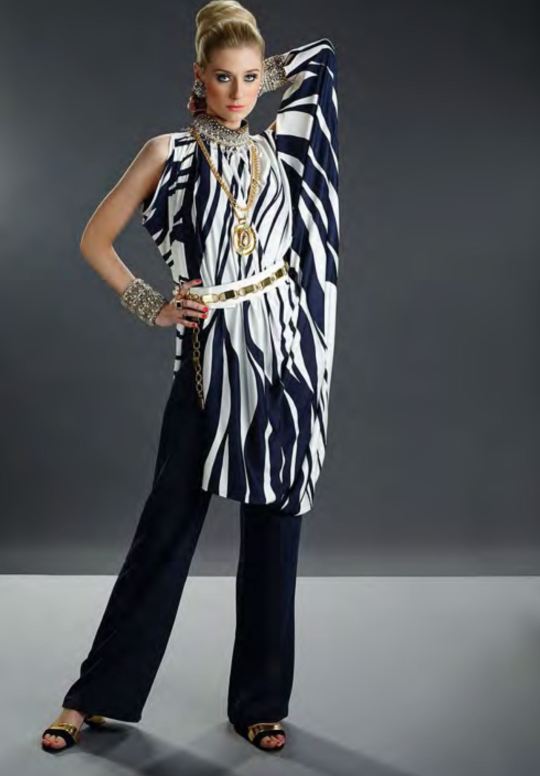
We meet Victoria Vinciguerra at a party she is hosting, which Napoleon Solo crashes to get close to her. The majority of Victoria's wonderful costumes in this movie are black and white, with gold accents, but this one has by far the most gold - even her sandals have it!
As an introduction to our villain, it's perfect. In a story where everyone has facades, with double agents and all, wearing an animal print is very appropriate. Is it a zebra pattern or a tiger? Is she the prey of super spy Solo or is she actually hunting him? A+ costume choice for this scene, no notes.
This also sets her apart from Gaby, our female hero. Victoria is far more done up - more makeup, dripping in accessories, complex pattern, there is nothing simple here. She is a fabulously wealthy woman and she is flaunting it.
As we'll see with the rest of her costumes, she's also clearly the one wearing the pants in the plots. Yeah, her husband may have inherited the business but she is definitely the one in charge at every point. While still looking fabulous.
Female representation: 10/10 Fantastic villain outfit, especially for a spy movie. Definitely set apart from the way villainesses are usually portrayed
Practicality: 10/10 It's obviously perfect for that context but I'm sure she could take care of anything that came up without breaking a sweat (or tripping over anything).
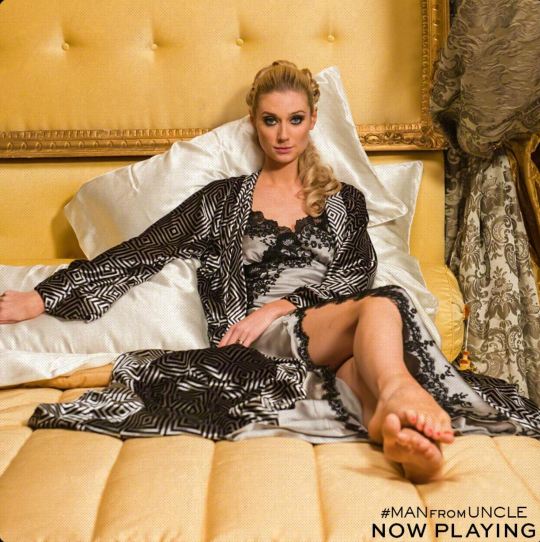
Both ladies wear their pajamas in this movie, and they couldn't be more different. Victoria continues to be the height of fashion, looking just as put together and intentional as she does in anything else she wears in this film. The geometric pattern on her robe is very fashionable and reinforces her black-and-white costuming. A little more gray here, perhaps begging the question of if she has been taken in by our charming spies (she has not)
Female representation: 10/10 I'm going to go off of the movie instead of this particular picture, lovely as it is. In the film, she wears this in a darkened room while behind her desk, on the phone. We do see her leave to go change, dramatically slamming the doors, but nothing else. Which makes it still one of the best filmed nightgown scenes I've come across - she continues to be gorgeous without catering to the male gaze (this isn't how women in spy movies are usually filmed, you know?)
Practicality: 9/10 Not sure they'd be the most comfortable pajamas but they're great for spending time in one's boudoir.
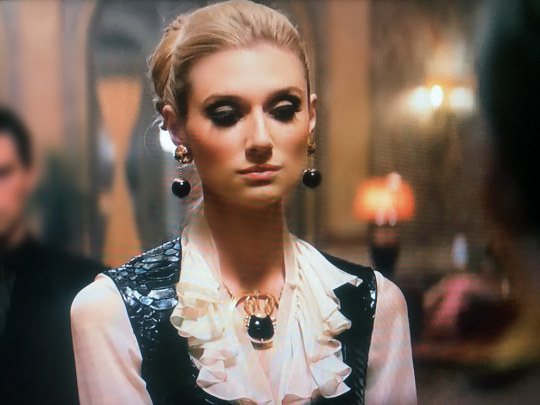

I wanted to include more detail, but couldn't in the distance shot. This is what she wears after hearing that someone has been snooping around, and she immediately goes to the hotel to investigate Solo. Her makeup is a bit less obvious than at the party, but she certainly has a full face. She even had time to accessorize before heading out. Her shoes might be gold, which is delightful.
The vest is clearly made of scales (alligator seems most likely to have been fashionable at the time, but it could be a kind of snake). Whatever the source, it is very appropriate for the villain of the story as she goes to investigate our hero with intent to kill. Before getting up to something a bit more entertaining.
Female representation: 10/10 For a snake-themed outfit our villainous lady wears to take out the hero, this is quite understated. Very focused on her own sense of fashion rather than the male gaze
Practicality: 10/10 One of the more practical things she wears in this movie, perfect for going to murder and/or sleep with a spy

I gotta be honest here, I'm not sure when she wears this (is it a deleted scene?). It's clearly in the lab, no doubt getting an update on what our spies have discovered. It's the least dressed-up we see her, while she still keeps to her color scheme.
Female representation: 10/10 Villain gets a report from her captive scientist wearing this? Perfection
Practicality: 10/10 It certainly rivals the last one in practicality, though I can't be sure what the whole ensemble looks like.
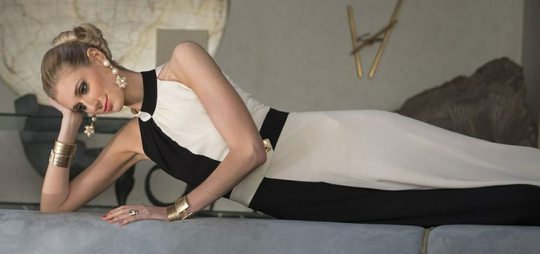
Absolutely show-stopping, I love how the costumes step up a notch for the climax (as does everything else). The clearly divided black and white is perfect for the way this scene plays out. Is she fooled by Solo or fooling him? She's worn pants in basically all of her scenes (other than her nightgown), but this one is definitely my favorite.
Female representation: 10/10 Our female villain poisons our spy hero in this outfit? Perfection once again
Practicality: 10/10 Fantastic choice for revealing your plans and taking down your nemesis

She wears this coat and scarf over her previous costume, while out and about to cause mischief. It fits her color scheme and style, but now that we all know she is the villain, the white is just an accent while black has taken over.
Female representation: 10/10 Again, for being the black costume our villainess wears in the climax, I can't think of anything more lovely and empowering. She's definitely in charge here.
Practicality: 9/10 I am sure she has underlings to grab things for her, but I don't feel like she could move her arms very much - something I consider important in a coat. Still, it's gorgeous.
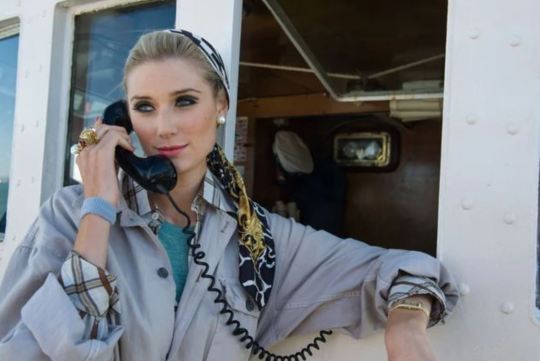
Her final costume in the film, when she is escaping on a fishing boat. Shockingly, she seems to have put on an outfit that isn't black and white, with even some blue! Presumably she was trying not to attract too much attention as she escaped on a simple fishing boat, but she is still incredibly stylish with proper accessories.
Female representation: 10/10 Again, female villain getting her comeuppance at the end, dressed very comfortably, you gotta love it
Practicality: 10/10 I can't see the whole thing, but Victoria always has the right outfit for the occasion, so I'm sure this is perfect for her current plot.
Want to hear more of my thoughts about female characters and fashion? Check out my other costume reviews or my YouTube channel (episode on Gaby out now!)
9 notes
·
View notes
Text
I'm sorry but some of the mental gymnastics I see on here in regards to House of the Dragon is wild, especially those on "Team Green", which, by the way, is the not the color of House Hightower. Can we please stop infantilizing Alicent and making her out to be this huge victim of misogny while calling Rhaenyra spoiled and greedy, as if she too was not forced into a marriage? No, Alicent was not scrubbing herself because she was ashamed of fucking Cole; she scrubbed herself raw because she has realized she is at the mercy of Larys, with whom she allied herself with last season to further her agenda and Otto, who has been manipulating her from the very beginning. She is the Queen Mother and an adult; she made the choice to be a hypocrite and fuck a Kingsguard. "But she deserves a lover after all the she's been through!!" Okay, but Rhaenyra should have suffered too? Let's not forget that it has been hinted at the Alicent and Cole have been "lovers" for many years, even when Visery's was alive. Alicent wants to talk about duty and sacrifice but only when it applies to shitting on Rhaenyra.
Listen, I think both women are super complex individuals who made their choices to the best of their ability while being held down by the men around them. However, "Team Green" wants to complain about misogyny in regards to Alicent but see no problem calling Rhaenyra spoiled, greedy, etc, etc. Be so real. Alicent placed her son on the throne, intentionally usurped Rhaenyra and oh yeah, her son Aemond killed Lucerys. (And no, I'm not cheering about Blood & Cheese but this is war. Game of Thrones should have taught you that no one is off limits, especially children.) Both sides have and will continue to make some really, really poor decisions that lead to the downfall of House Targaryen but man am I tired of all these "ou ,ou, poor Alicent, Aemond, Aegon, Heleana posts." Let's remember that Aegon is a rapist, and Aemond murdered a child with his dragon. Let's also remember Daemon is unhinged and always has been. No side is entirely "good" and the lack of nuance on so many of these posts is disappointing.
#house of the dragon#mini rant#sorry not sorry#rhaenyra targaryen#alicent hightower#complex characters#fandom drama#not team green#or team black
7 notes
·
View notes